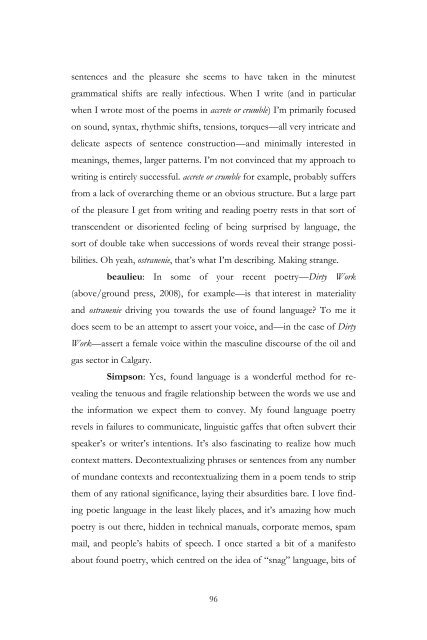CONTACT WITH POETS
Ev4Qw3
Ev4Qw3
Create successful ePaper yourself
Turn your PDF publications into a flip-book with our unique Google optimized e-Paper software.
sentences and the pleasure she seems to have taken in the minutest<br />
grammatical shifts are really infectious. When I write (and in particular<br />
when I wrote most of the poems in accrete or crumble) I’m primarily focused<br />
on sound, syntax, rhythmic shifts, tensions, torques—all very intricate and<br />
delicate aspects of sentence construction—and minimally interested in<br />
meanings, themes, larger patterns. I’m not convinced that my approach to<br />
writing is entirely successful. accrete or crumble for example, probably suffers<br />
from a lack of overarching theme or an obvious structure. But a large part<br />
of the pleasure I get from writing and reading poetry rests in that sort of<br />
transcendent or disoriented feeling of being surprised by language, the<br />
sort of double take when successions of words reveal their strange possibilities.<br />
Oh yeah, ostranenie, that’s what I’m describing. Making strange.<br />
beaulieu: In some of your recent poetry—Dirty Work<br />
(above/ground press, 2008), for example—is that interest in materiality<br />
and ostranenie driving you towards the use of found language? To me it<br />
does seem to be an attempt to assert your voice, and—in the case of Dirty<br />
Work—assert a female voice within the masculine discourse of the oil and<br />
gas sector in Calgary.<br />
Simpson: Yes, found language is a wonderful method for revealing<br />
the tenuous and fragile relationship between the words we use and<br />
the information we expect them to convey. My found language poetry<br />
revels in failures to communicate, linguistic gaffes that often subvert their<br />
speaker’s or writer’s intentions. It’s also fascinating to realize how much<br />
context matters. Decontextualizing phrases or sentences from any number<br />
of mundane contexts and recontextualizing them in a poem tends to strip<br />
them of any rational significance, laying their absurdities bare. I love finding<br />
poetic language in the least likely places, and it’s amazing how much<br />
poetry is out there, hidden in technical manuals, corporate memos, spam<br />
mail, and people’s habits of speech. I once started a bit of a manifesto<br />
about found poetry, which centred on the idea of “snag” language, bits of<br />
96


